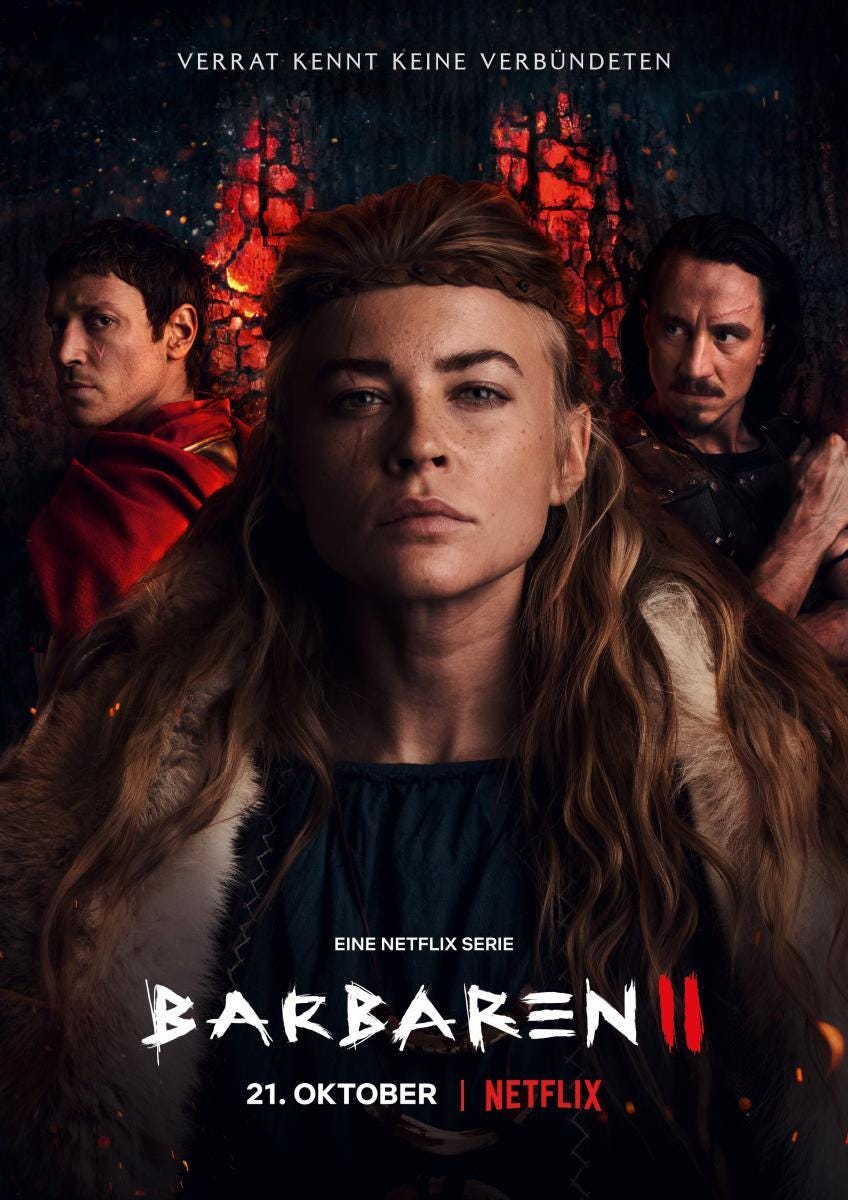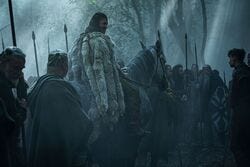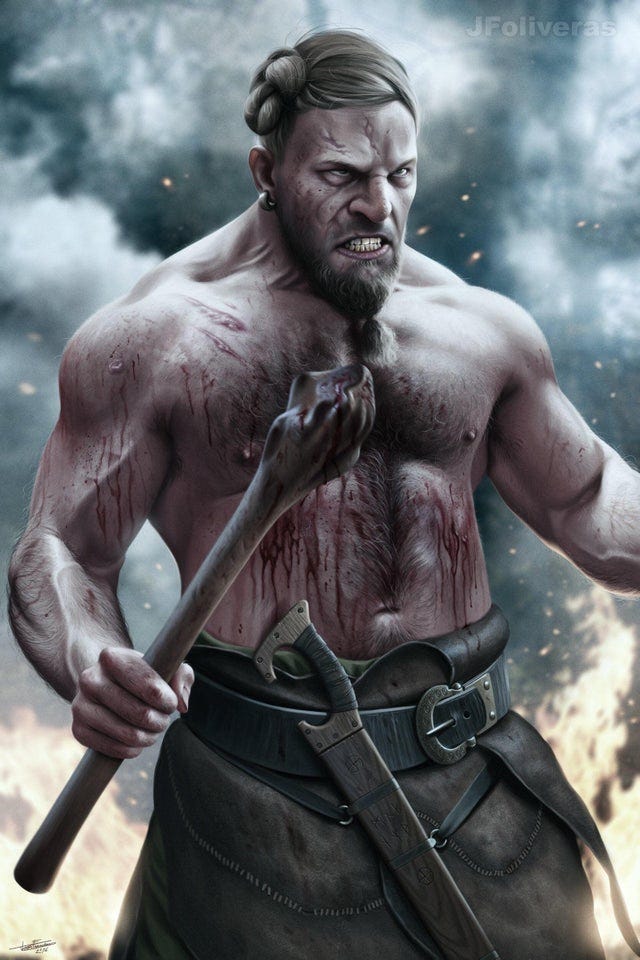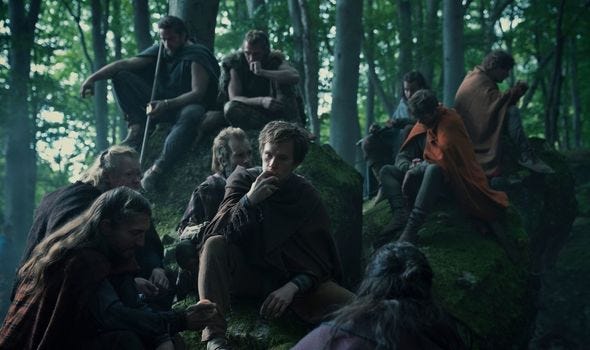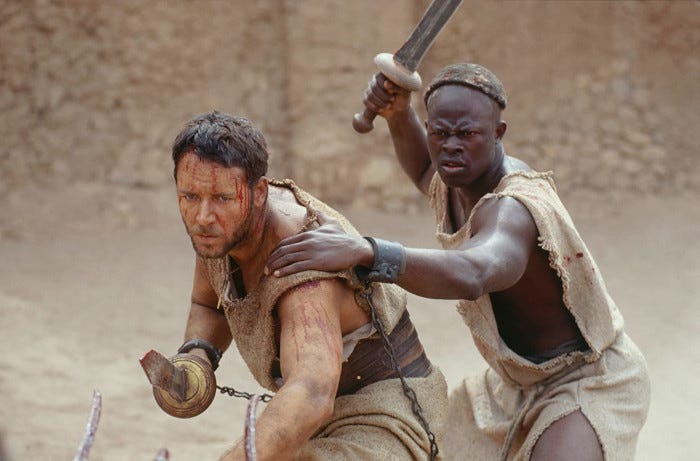Review of "Barbarians" (Season 2), on Netflix
Not the MOST egregious violation of historicity, but flagrantly modern in its telling. Okay it is pretty egregious.
Game of Thrones was an absolute double-edged sword for the fantasy/historical fantasy/historical fiction genres on the small screen. On one hand, it brought these genres back in to mainstream popularity, but on the other hand, well… it brought these genres back into mainstream popularity, meaning these genres have been back in business for a while. Big business. And, we all know what big business does to art and culture. Do not be fooled, the huge influx of sword and shield themed content over the past ten years has not been the result of a passionate love for history and fantasy suddenly rekindled, but rather the result of a desperate and greedy search by entertainment studios for source material that they can use to capitalize on the success of GoT. So yes, we live in a world now where a show about first century Germanic tribal warfare can at least get made, but unfortunately it cannot be a pure work by free men. Rather, it was born, like many of its peers, under the oppressive yoke of the (largely post-modern) Game of Thrones formula, and while not necessarily an outright slave, it certainly pays a hefty tribute. The problem, is that the nuanced ethos of the peoples, events, and era are severely muddied, almost beyond recognition.
Barbarians is not entirely, 100%, a lost cause. Let us briefly go over some of the more positive things about it:
Splitting dialogue between languages (latin for the Romans, modern German for the barbarians) is an excellent choice, and certainly does wonders for immersion.
Costuming, including hairstyles and arms and armour is well above the status quo of historicity, and while the Germans still have their share of absurd leather armor, and a weird variety of modern facial hair, they also have proper belted tunics in a variety of colours, pinned cloaks, cherusker swords, spears and long hexagonal or oval shields, even real Suebian knots! Unfortunately, quite often this unique authenticity is found on the extras…
…while the ridiculousness is reserved for the main characters:
Okay, why do they look like bad skyrim cosplayers?
Stay positive, stay positive…
Now, the Romans, have clean shaven faces and the distinctive short hair cut, and generally look like pretty good Romans. They have a nice mixture of kit (including lorica segmentata, lorica hamata, squamata, and musculata for the officers) that I think soundly reflects a realistic variety for the first century AD.
However, the unpardonable sin of unpolished armor HAS been committed throughout. If you don't understand why armor polishing was a necessary discipline for every legionary, especially in swampy German river terrain, you have probably never owned an item made from iron/carbon steel.
Now actual use of the weapons and armor is a different matter. Fight and battle scenes often devolve quite quickly into the usual rush of confusing quick-cuts, or when they are clear and visible, are often non-sense theatre. Dual-wielding while naked is really not as effective as hollywood thinks it is. And, why must every type of sword be a fencing weapon at some point? Are shields just not exciting enough to justify their obvious battlefield value? Why wear armor if edged weapons go through it like it was glorified styrofoam? Does anyone ever actually train with a spear, THE most common battlefield weapon of the ancient world?
Things don't improve a whole lot when we talk about cinematography in general. Now, this wasn't as much the case in season one, but thinking back over season two, I can hardly recall any truly stunning visual moments, with perhaps the brief exception of the river fleet arrival near the end. War in the ancient world was conducted on a grand scale, with tens of thousands of participants being the norm even in minor battles. That scope is completely lost here. I never felt, once, like I was witnessing monumental, Earth shaping events from history. Rome vs. Germania in the first century was a seismic collision of incredible importance to the future of Europe, and relying on shots of four or five thatched huts or legion tents that quickly transition to interiors (where the bulk of the drama's screentime exists) just doesn't communicate that. In the forest and other exterior shots, there are rarely more than fifty people gathered at maximum, and these are quite few and far between.
Look, it isn't getting better from here. The music/score failed to make a lasting emotional impression at all, despite that being literally its main function - as emotional context to drive home on-screen events. I live for spine-tingling moments of greatness. Say what you want about Hans Zimmer, but I will never, ever forget the first fight in Rome's coliseum from Gladiator. “Single column! Single column!”
We are about to get to the goat meat and sweet potatoes of this review, and from here on out, it is no-holds-barred on spoilers, on the off chance you still care about that…
If I told you about a man who had the balls to stand up to the might of the Roman empire in its prime; a man who had the charisma to unite and rally the disparate tribes of his kinfolk; a man with the iron nerves to lead his heavily armed opponent into ambush, and always fight them at the forefront, what are some reasonable assumptions we could make about such a man? Surely, above all else, this would be a man of presence. This would be someone whose footsteps would thunder even in silence.
This is Arminius.
Imagine being the casting director tasked with finding someone to fill boots that big, and you get a headshot of this man in the mail,
and think, okay, he looks sufficient for the role of a warrior chieftain of near mythological status. Laurence Rupp is not a bad actor. He is not an amateur. But, all throughout both seasons of the show, he comes across as various degrees of subdued, diminutive, at worst even sniveling. All under the pretense, I suppose, of wisdom and reserve. He has the air of a coward, and seems to be about half the man he should be, which I guess was necessary to make room for his wife, Thusnelda, who in this show plays the other half of the hero Arminius. His masculine half. The side with fury and conviction.
Let us keep in mind that not a single historical source mentions Thusnelda once participating in a battle, let alone becoming a de facto leader. If the show wanted the female pagan warrior archetype at the forefront, they could have gone across the English channel and told Boudica's story. Instead they had to bastardize Arminius. Granted, there is a lot that ancient historians like Tacitus don't tell us about Arminius, and that leaves a lot of space to fill. So, what approach do the writers take in reasoning out the missing details? Do they extrapolate thoughtfully from source material, based on a thorough understanding of the time and place? No, of course not. They default to the assumptions that post-modern ideology makes about human nature. We don't have any evidence to believe Thusnelda was a martial character who shouldered a huge portion of the leadership role of Arminius, and yet, they choose this, a priori, seemingly as the most *believable* option to explain his greatness of character.
Building a story out of the bricks of historical truth, but using discordant post-modern ideology as the mortar is the recurring theme of this show. And some episodes are mostly mortar.
Season two is set in the vaguely defined time period after the battle of Teutoburg Wald, in the days leading up to, as Tacitus calls it, “Rome's vengeance.” The Cherusci sense this Roman malice, and determine to make an appeal to the Reiks (chieftains) for support. We are introduced to Marbod (Marboduus), a chieftain of the Marcomanni who had moved his people eastward to be outside the sphere of Roman influence. Little is said about Marbod in history. We know that, like Arminius and Flavus, he had been tribute to Rome and grown up there. However, the show tell us that he was boyhood companion of these two, kind of a third brother to them, which historical texts do not seem to agree with. Tacitus tells of a passionate argument between Flavus and Arminius on the eve of battle, from opposite banks of a tributary of the Rhine, so there is well established tension between the two. The show, however, extends this tension further, and has Marbod lure Arminius into the forest alone so Flavus can ambush him, and ridiculous fencing with short swords ensues in the mist. When Arminius is about to win, Marbod, a married man, knocks him in the back of the head in an effort to save his secret homosexual lover.
Oh yes, you read that right. The show has created a homosexual relationship between Flavus and Marbod, who according to history, never even interacted. The GoT-esque post-modern mortar is showing. This was the first major immersion breaking revelation of the story for me. It isn't that Marbod being a closeted homosexual is entirely impossible, it is just that there are so many other ways of much higher probability and historical relevance to make an interesting story out of this man.
Tacitus, on Germania:
The ancient Germans were a proud, simple people, who placed immense value on freedom, honour, glory, prestige, and chastity. Myth, legend, and heredity were extremely important concepts. When not fighting Rome, the tribes fought amongst themselves for position, status and territory. Marbod was almost certainly given to jealousy of Arminius, for Arminius had achieved the kind of renown and fame that was the true lust of the Germans. There is plenty of substance in such a relationship build a story around without needing to descend into unlikely post-modern speculation.
In fact, beyond the costuming, the Germans are in general poorly represented, and not just in character and behaviour. If there is one thing, above all, that Tacitus and the other Roman authors reiterate time and time again, it is the great bodily size of the Germans, both in height and limb. These were huge people.
Julius Caesar:
The Germans of the show do not convey this physicality of lifestyle. They are not imposing or intimidating. Really, more than fierce, independent, war-like barbarians, they just kind of come across, as down-trodden medieval peasants.
The exception here, is my personal favourite character from Season 2, Odwulf, who is maybe the only authentic looking Germanic body in the show, and was likely deliberately added to beef up the physically unimpressive cast.
Imagine thousands of warriors looking more or less like this guy, and you have much better representation.
Returning to the story, with Arminius captured by the Romans, after literally getting rocked by Marbod, the next major event is the re-introduction of season 1's Folkwin (who never existed), the other third of the Arminius/Thusnelda live triangle. (Again, GoT material, totally ahistorical, improbable, and poor distraction from lack of real period content) Folkwin also brings with him a wife of his own, Dido. Ethnically, she appears to be sub-saharan African, from Carthage, who has found her way, through vague backstory, deep into the misty depths of Germania. The Roman empire was expansive, and by nature of that expanse, covered a fairly ethnically diverse set of lands. I always thought it was super neat in Gladiator to see captured warriors from all over the empire come together and fight beside each other in the arena.
It was awesome because it was not only unique, and visually striking, but believable. Unfortunately, this isn't the case with Dido's arc. It is blatantly obvious that her story was born out of the atmosphere of fear that we live in - fear of offending the peddlers of identity politics, so deep, that diversity must be introduced at all costs, even if it means stretching the imagination outside the reaches of probability. There is nothing wrong with telling ethnically diverse stories in the context of the Roman empire, but when one is invented and inserted in a highly unlikely and unnecessary way, either as adherence to ideology or a weak demographic expanding marketing ploy, the result is another jarring reminder that we live in 2022, and not the first Century AD, and that is immersion breaking. Perhaps if the world was in a different place politically, I wouldn't even take notice here, but in our present status quo, it feels as abrupt and obvious as a tooth-paste ad.
Thusnelda, Folkwin (who never existed), and Dido rescue Arminius from the Roman camp; Dido discovers Germanicus while there, a consul and commander who murdered her father. She gets wounded on the way out and lies around in a fever for the next few episodes.
By the end if episode 3, it was becoming hard to stay awake. Most of the screen time is now dedicated to characters lamenting and debating their very modern emotional issues, in very modern ways. The idea of a modern audience needing to always “relate" to characters is bullshit. I want escapism, spectacle, grandeur, journey. When I read a book or watch a show, I want to go to sleep in this world and wake up in another.
Oh yeah, so, anyway, Arminius had a son in Rome, raised Roman (ahistorical of course) who he drags back to live with the Cherusci, which further complicates the Arminius/Thusnelda/Folkwin love triangle, and adds lots of room for sad, absent-father themed dialogue. Marbod broods a lot about his gay lover, and then has a duel with Arminius for rulership, Arminius wins dishonorably, and chooses to kneel in front of Marbod anyway.
Episode four features Tiberius sending Flavus to Marbod with instructions for Flavus to be killed, and a good chunk of the episode is dedicated to Marbod's emotional turmoil over having to choose between his gay lover and his submission to Rome, but by the time he has worked up the nerve to commit murder, Arminius' non-existent son Gaius has already freed Flavus, and instead of having to choose, Marbod gets hit in the head by the man he saved a few episodes ago by hitting someone in the head. The episode ends with the announcement that an assembly is being convened to make Marbod a king officially. Of course it is decided that they must all do this unarmed,
which enables the Romans to ambush them completely unopposed. The episode ends with a B-movie level arrow through an eye.
The next episode begins with a large portion of the supporting cast dying suddenly red-wedding style in a shower of Roman arrows (including Odvulf, the best character), until Folkwin (who never existed) shows up dual-wielding and droves off the entire Roman force by himself (which was never at the assembly that didn't happen) in the shows first heroic but painfully campy moment. Arminius sends the other two thirds of his love triangle off by themselves on a four day journey to procure Marbod's Marcomanni warriors, because apparently they will only listen to Thusnelda. A massive Roman fleet is then discovered sailing down the Rhine, and it is decided that they should hurry up and besiege the Roman fort before the reinforcements arrive. If you are angered by how little sense this makes, you might enjoy knowing that in history, these events happened in opposite order. The fort was occupied by Germans, and THEN they discovered a fleet was on its way, and fled.
The sixth and final episode is all messy quick-cut battle shots with lots of fencing, and smoke is used to obscure the tactical inconsistencies and generally underwhelming scale of the field maneuvers. Flavus, who was never at the fort, dies here, Dido doesn't quite get her long awaited revenge, and Folkwin (who never existed) gets killed by Germanicus, and tells Arminius with his last breath that it was actually he, Folkwin (who never existed) that impregnated Thusnelda. In a historically true event that happened before this battle, Segestes, Thusnelda's father, sells her and Arminius's young son out to the Romans.
End season.
If that feels short, it is because it was. The season was only six episodes, mostly populated with filler dialogue based around the characters invented, very GoT style relationships.
What a waste.
The truth of the matter is, there just wasn't a lot of history here. It was all cobbled together plots that do not reflect the era in so far as ancient texts and archaeological evidence has established it, but rather they reflect assumptions about human nature made by post modern thought. Without the great costuming, and the names of historical people and places, you could be watching any random netflix drama. This series is not a window into a world of the past; it is a dressed up reflection of our own, with its controversial elements deliberately pushed to the forefront. Just like Game of Thrones, but a lot more dry.
You are less likely to fall asleep if you just shut the TV off and read Tacitus’ Annals.
Which is a good idea.
Go do that. Then lift some stones or something.




